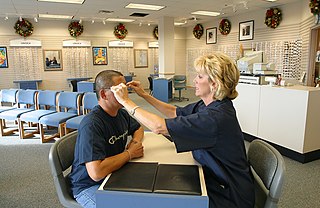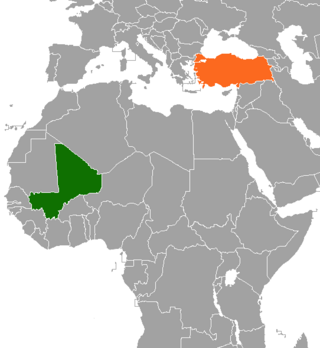History
Founded in September 1972 by Ismael Konate under the name Malian Association for the Welfare of the Blind (AMPSA), it was later renamed UMAV in 1984. Since then from the schools, there have been 85 blind and visually impaired graduates with 83 integrated in the public and private sector.
Since its creation, more than 25 classrooms have been built in Bamako and Gao. After its success, land was then purchased for the school in Segou. Two dormitories have since been built for boys and girls as some children had to travel far to get to the schools. Also, a round meeting hut, study room and resource center for training was built.
Recently the computer room has been adapted for blind users, with a computer that prints braille, which is the only one of its kind in Mali.

The economy of Mali is based to a large extent upon agriculture, with a mostly rural population engaged in subsistence agriculture.

The Malian Armed Forces consists of the Army, Republic of Mali Air Force, and National Guard. They number some 7,000 and are under the control of the Minister of Armed Forces and Veterans. The Library of Congress as of January 2005 stated that "[t]he military is underpaid, poorly equipped, and in need of rationalization. Its organisation has suffered from the incorporation of Tuareg irregular forces into the regular military following a 1992 agreement between the government and Tuareg rebel forces."

Bamako is the capital and largest city of Mali, with a 2022 population of 4,227,569. It is located on the Niger River, near the rapids that divide the upper and middle Niger valleys in the southwestern part of the country.

An optician is an individual who fits eyeglasses or contact lenses by filling a refractive prescription from an optometrist or ophthalmologist. They are able to translate and adapt ophthalmic prescriptions, dispense products, and work with accessories. There are several specialties within the field.
The Rail Band is a Malian band formed in 1970; it was later known as Super Rail Band, Bamako Rail Band or, most comprehensively and formally, Super Rail Band of the Buffet Hotel de la Gare, Bamako.
The mass media in Mali includes print, radio, television, and the Internet.

According to the U.S. Department of State's annual report on human rights in Mali for 2003, Mali's government generally respects the human rights of its citizens and observes relevant constitutional provisions and prohibitions.
Balla Moussa Keïta was a Malian actor and comedian, and a West African cinema pioneer who was well known in the West. Born in the Ségou Region of Mali as a traditional prince of the Keita dynasty, he was originally a radio producer. He later turned to acting and acted in a number of movies by notable Mali directors like Cheick Oumar Sissoko, Souleymane Cissé and Abdoulaye Ascofaré. Among his critically acclaimed roles are those of the tribal king Rouma Boll in Yeelen and as Mambi in Guimba, un tyrant, une époque. He received the Best Male Interpretation award at the FESPACO for his role in the Guinean film Séré, le témoin.

The Office of Radio and Television of Mali is the national broadcaster of the West African state of Mali.

Education in Mali is considered a fundamental right of Malians. For most of Mali's history, the government split primary education into two cycles which allowed Malian students to take examinations to gain admission to secondary, tertiary, or higher education. Mali has recently seen large increases in school enrollment due to educational reforms.

The status and social roles of women in Mali have been formed by the complex interplay of a variety of traditions in ethnic communities, the rise and fall of the great Sahelien states, French colonial rule, independence, urbanisation, and postcolonial conflict and progress. Forming just less than half Mali's population, Malian women have sometimes been the center of matrilineal societies, but have always been crucial to the economic and social structure of this largely rural, agricultural society.
A sighted child who is reading at a basic level should be able to understand common words and answer simple questions about the information presented. They should also have enough fluency to get through the material in a timely manner. Over the course of a child's education, these foundations are built on to teach higher levels of math, science, and comprehension skills. Children who are blind not only have the education disadvantage of not being able to see: they also miss out on the very fundamental parts of early and advanced education if not provided with the necessary tools.
The Royal London Society for Blind People (RLSB) was a UK charity that existed for 175 years to help blind and partially sighted young people in London and the South East through a blend of sports, education, and creative and developmental services.

The World Association of Children's Friends (AMADE) is a charity organization founded by Grace, Princess of Monaco, to support the development, education, and health of children worldwide. AMADE operates through a network of 12 local organisations in Europe, Asia, South-America and Africa. The Association has consultative status with UNICEF, UNESCO and the United Nations Economic and Social Council, as well as participative status with the Council of Europe.
The BASMA Association for the Promotion of Employment of the Disabled is a charitable association. It was established on March 7, 2000, by Mrs. Leila Ben Ali, the wife of the former president of the Republic of Tunisia, Zine El Abidine Ben Ali. The BASMA Association seeks to back up the State's efforts in the integration of disabled people, particularly by contributing to enhancing their employment, offering them assistance in finding jobs in both the public and private sectors and also in starting their own projects. The association endeavors to disseminate the spirit of initiative and the sense self-reliance amongst disabled people and persons with specific needs, so as to repel the notion of dependency and to urge them to actively contribute to their own integration in the socio-economic circuit. BASMA contributes also to the training and employment of disabled people, and aids them market their products and participate in various trade fairs and events.
Henshaws Society for Blind People is a specialist charity providing support, advice and training to anyone affected by sight loss and other disabilities.
George Harold Marshall OBE was a British schoolteacher, head master, author, academic and campaigner, internationally recognised for his work in the fields of education and assistive technology for children with visual disabilities. Marshall started Exhall Grange, Britain's first school to cater specifically for partially sighted children in 1951, becoming the third and was its head master from 1953 until he retired in 1981, making him to date the longest-serving person to hold that position. He also founded The Partially Sighted Society.
The National Council for the Blind, Malaysia (NCBM) set up the Braille Press on 1 April 1998 under the Chairmanship of the late Datin Roquaiya Hanim Tun Hussein. It was officially declared open by Yang Berhormat Dato’ Sri Mohd. Najib Tun Abdul Razak, the then Minister of Education, Malaysia, on 24 November 1998.

Keïta Aminata Maiga, also known as Aminata Maïga Keïta, is a Malian healthcare, public health, and children's advocate, and the widow of former President Ibrahim Boubacar Keïta. Under this capacity, she served as the First Lady of Mali from 4 September 2013 until 19 August 2020. During her tenure as first lady, Maiga has promoted improvements in healthcare, education, the welfare of mothers and children, the environment and athletics. Maiga, an opponent of child marriage, launched a national campaign in October 2015 to end the practice in Mali.

Mali–Turkey relations are the foreign relations between Mali and Turkey. Turkey has an embassy in Mali since February 1, 2010 and Mali opened an embassy in Ankara on June 27, 2014.










